Press releases
Crops grown in Belarus president’s experimental fields revealed

MINSK, 23 September (BelTA) – The harvesting campaign is in full swing in Belarus. The harvesting of cereals will be followed by vegetable crops. Crops are also being gathered in from experimental fields of the Belarus president, BelTA has learned.
The Belarusian head of state pays a huge amount of attention to agriculture. Aleksandr Lukashenko always keeps an eye on the development of agribusiness. Apart from that, the president personally carries out experiments in order to stay up-to-date with the latest trends in agriculture, try new technologies and new crops. Afterwards the best and most successful results are adopted on the grand scale.
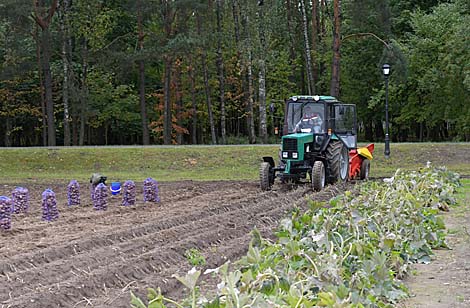 The head of state traditionally tries various kinds of agricultural crops. Scientists of the Applied Research Center for Potato, Vegetable, and Fruit Farming of the National Academy of Sciences of Belarus help grow the crops. For instance, wheat yield in the president’s experimental field has been at 92 centners per hectare this year. As for forage harvesting, excellent hay has been cut three times.
The head of state traditionally tries various kinds of agricultural crops. Scientists of the Applied Research Center for Potato, Vegetable, and Fruit Farming of the National Academy of Sciences of Belarus help grow the crops. For instance, wheat yield in the president’s experimental field has been at 92 centners per hectare this year. As for forage harvesting, excellent hay has been cut three times.
Aleksandr Lukashenko also tries growing fruits and berries, which would be described as exotic in Belarus as little as ten years ago. Now even watermelons and muskmelons are grown in the country.
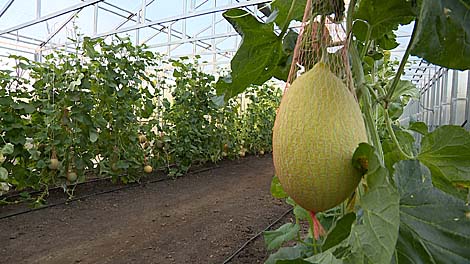 This year seeds for the gourds have been brought directly from Uzbekistan. Upon Aleksandr Lukashenko’s request his counterpart and friend Shavkat Mirziyoyev sent the best seeds of Uzbek muskmelons. The harvest was collected in the presidential greenhouse literally several days ago.
This year seeds for the gourds have been brought directly from Uzbekistan. Upon Aleksandr Lukashenko’s request his counterpart and friend Shavkat Mirziyoyev sent the best seeds of Uzbek muskmelons. The harvest was collected in the presidential greenhouse literally several days ago.
Aleksandr Lukashenko also attentively albeit remotely keeps an eye on the garden of Belarus-Tajikistan friendship. In line with the arrangement made by Aleksandr Lukashenko and Tajikistan President Emomali Rahmon as many as 6,000 saplings of apricots, sweet cherries, apples, and several varieties of grapes have been brought from Central Asia to Brest Oblast.
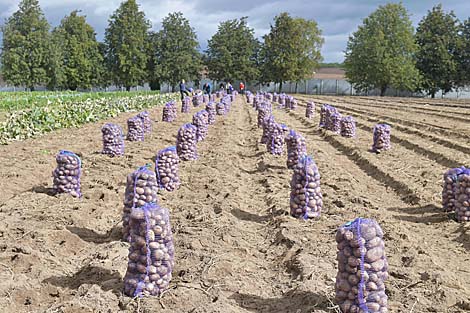 The harvesting of various varieties of potatoes started in the presidential fields the other day. The head of state personally takes part in it, weather and his busy schedule permitting. Those, who spend the rest of the week wearing business suits, help him with harvesting. Agricultural specialists offer a helping hand, too, considering the amount of work required. This year’s potato harvest has been truly great. Over 120 tonnes of potatoes has already been collected from the presidential fields. Potato harvesting still continues. The resulting harvest is expected to be nearly twice the figure. Belarusian potato varieties demonstrate yields of over 600 centners per hectare.
The harvesting of various varieties of potatoes started in the presidential fields the other day. The head of state personally takes part in it, weather and his busy schedule permitting. Those, who spend the rest of the week wearing business suits, help him with harvesting. Agricultural specialists offer a helping hand, too, considering the amount of work required. This year’s potato harvest has been truly great. Over 120 tonnes of potatoes has already been collected from the presidential fields. Potato harvesting still continues. The resulting harvest is expected to be nearly twice the figure. Belarusian potato varieties demonstrate yields of over 600 centners per hectare.
Thus, for many years the presidential fields have been used as an experimental site for Belarusian crop breeders. They also allow Aleksandr Lukashenko to pursue his favorite hobby in addition to providing bonuses for the entire branch of the economy.
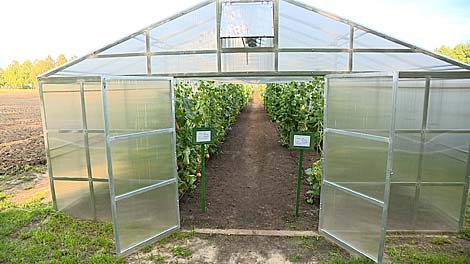 Potato harvesting and vegetable harvesting are in progress in Belarus. As of 23 September, 48% of the areas under potatoes in agricultural enterprises has been harvested. About 430,800 tonnes has been collected, with the average yield at 325 centners per hectare, 36 centners up from last year’s figure. Over 150,000 tonnes of vegetables has been collected, including in greenhouses. The figure includes roughly 40,000 tonnes of cucumbers, 57,000 tonnes of tomatoes, 224 tonnes of eggplant, 235 tonnes of pepper, 4,700 tonnes of white cabbage, 187 tonnes of Chinese cabbage, 164 tonnes of cauliflower, 5,200 tonnes of beetroot, 25,000 tonnes of carrots, 4,500 tonnes of vegetable peas, 730 tonnes of zucchini, and 11,700 tonnes of onions.
Potato harvesting and vegetable harvesting are in progress in Belarus. As of 23 September, 48% of the areas under potatoes in agricultural enterprises has been harvested. About 430,800 tonnes has been collected, with the average yield at 325 centners per hectare, 36 centners up from last year’s figure. Over 150,000 tonnes of vegetables has been collected, including in greenhouses. The figure includes roughly 40,000 tonnes of cucumbers, 57,000 tonnes of tomatoes, 224 tonnes of eggplant, 235 tonnes of pepper, 4,700 tonnes of white cabbage, 187 tonnes of Chinese cabbage, 164 tonnes of cauliflower, 5,200 tonnes of beetroot, 25,000 tonnes of carrots, 4,500 tonnes of vegetable peas, 730 tonnes of zucchini, and 11,700 tonnes of onions.
Tatiana Karbanovich, Deputy Head of the Central Office for Crop Husbandry of the Belarusian Agriculture and Food Ministry, said: “We are taking all measures to provide the population with fruits and vegetables. State-run agricultural enterprises and private farmers are expected to gather in 624,000 tonnes of vegetables (14% up from 2018) and over 1 million tonnes of potatoes (111% as against 2018). Agricultural enterprises of all kinds are expected to gather in 1.6 million tonnes of vegetables and over 6 million tonnes of potatoes. The harvest will satisfy the domestic demand in addition to providing spare resources, including for export.”
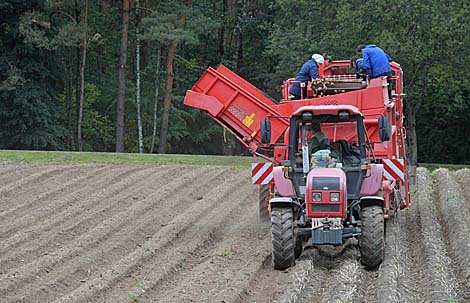 In between the seasons of 2019-2020 the country’s vegetable storage facilities will keep 43,600 tonnes of potatoes, 23,200 tonnes of cabbage, 8,300 tonnes of beetroot, 12,300 tonnes of carrots, and 12,600 tonnes of onions. The acquisition and storing process has already started. Individual farmers and agricultural enterprises have storage facilities of their own. Fairs will be arranged in the capital city, the oblast capitals, and the district ones in order to satisfy the nation’s demand for potatoes, fruits, and vegetables. Special sites will be arranged where agricultural enterprises and private farmers will be able to sell their products directly.
In between the seasons of 2019-2020 the country’s vegetable storage facilities will keep 43,600 tonnes of potatoes, 23,200 tonnes of cabbage, 8,300 tonnes of beetroot, 12,300 tonnes of carrots, and 12,600 tonnes of onions. The acquisition and storing process has already started. Individual farmers and agricultural enterprises have storage facilities of their own. Fairs will be arranged in the capital city, the oblast capitals, and the district ones in order to satisfy the nation’s demand for potatoes, fruits, and vegetables. Special sites will be arranged where agricultural enterprises and private farmers will be able to sell their products directly.







 print version
print version make home page
make home page add to bookmarks
add to bookmarks

